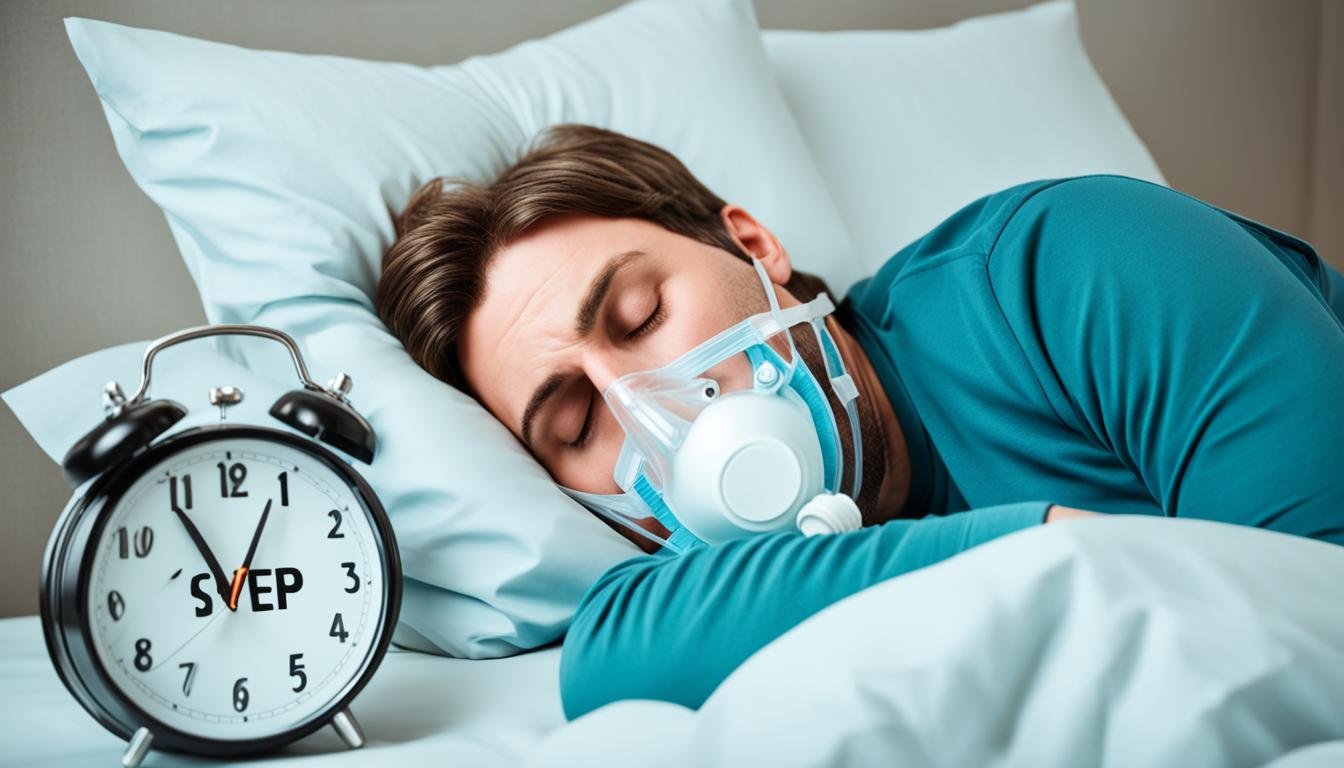Sleep apnea makes you stop breathing many times as you sleep. It often happens when your throat closes, stopping air from getting through. This can lead to big health problems like heart disease, stroke, and even losing your life early.1 Luckily, treating sleep apnea can help you live longer and feel better. Let’s talk about how sleep apnea affects how long we live, the dangers of not treating it, and what we can do to help.
Key Takeaways
- Untreated sleep apnea can shorten life expectancy by several years, primarily due to increased risks of cardiovascular disease and stroke.
- Proper treatment, such as CPAP therapy or oral appliances, can significantly improve life expectancy for individuals with sleep apnea.
- Mild sleep apnea may have a smaller impact on life expectancy if managed through lifestyle changes, while moderate and severe cases require more intensive treatment.
- Addressing sleep apnea can help reduce the risk of developing other chronic conditions, such as hypertension and type 2 diabetes.
- Seeking early diagnosis and adhering to recommended treatment plans are crucial for managing sleep apnea and protecting long-term health.
What is Sleep Apnea?
Sleep apnea is a type of sleep disorder.2 It makes a person stop breathing often during sleep.2 A common reason is when throat muscles relax and block the airway.
This is called obstructive sleep apnea.2 Another type, central sleep apnea, happens when the brain doesn’t send the right signals to breathe.2
Sleep Apnea Definition and Overview
Sleep apnea causes short pauses in breathing at night.3 These pauses can cause health problems over time.3 It’s important to know the types to treat it well.
Types of Sleep Apnea
There are two types of sleep apnea.2 Obstructive sleep apnea is more common. It’s when throat muscles relax and block the airway.2
Central sleep apnea is not as common. It occurs when the brain doesn’t tell the body to breathe.2 This leads to breathing pauses as well.
Obstructive Sleep Apnea vs. Central Sleep Apnea
The main difference between the two is their cause.2 Obstructive sleep apnea happens because of a physical blockage. Central sleep apnea is because of a brain issue. The brain doesn’t control the breathing muscles well.2 Knowing this helps doctors choose the right treatment.
| Type of Sleep Apnea | Cause | Prevalence |
|---|---|---|
| Obstructive Sleep Apnea | Relaxation of throat muscles blocking the airway | Most common type2 |
| Central Sleep Apnea | Brain fails to signal muscles to breathe | Less frequent2 |
Common Signs and Symptoms of Sleep Apnea
The common signs of sleep apnea are snoring and gasping for air during sleep.4 You might also feel really tired during the day and have fatigue.4 Snoring shows your airway might be blocked.4 You could wake up many times and feel tired even if you slept all night, which can make you more likely to have accidents.
Snoring and Gasping for Air During Sleep
Loud, bothersome snoring hints at sleep apnea.4 It might come with gasping or choking as you struggle to get air while asleep.4 These breaks in breathing can happen frequently, ruining how well you sleep.
Excessive Daytime Sleepiness and Fatigue
If you have sleep apnea, you’ll often feel very sleepy during the day despite sleeping the whole night.4 This happens because your sleep is often disturbed by these breathing stops. Being tired during the day can make it hard to think, focus, and do daily tasks.
Other Signs of Sleep Apnea
Besides the above, signs can also include having a dry mouth, trouble focusing, feeling sad, gaining weight, and getting headaches or migraines.4 These issues can really affect your health and life quality, showing why it’s important to see a doctor soon.
Spotting these signs early is key to get the right help and avoid worse health issues.4
How Long Can You Live With Untreated Sleep Apnea?
Leaving sleep apnea untreated is serious. It raises risks for heart diseases like high blood pressure, heart attacks, and heart failure.5 Stroke risk also goes up. A study in Wisconsin showed that people with untreated sleep apnea are more likely to die early. This is mainly because of heart problems.5 So, getting the right treatment is very important for a longer life.
Increased Risk of Cardiovascular Disease
Not treating sleep apnea puts a lot of stress on your heart. This can lead to high blood pressure, heart issues, and bigger chances of heart attacks and failures.5 A 2018 Danish study found a 38% higher heart failure risk in people over 60 with untreated sleep apnea. This risk was over 13 years.5
Higher Likelihood of Stroke
Untreated sleep apnea harms your blood vessels and increases inflammation. This helps plaque and clots form, leading to strokes.5 In 2014, the American Academy of Sleep Medicine noted that people with sleep apnea had four times the stroke risk of others.5
Impact on Life Expectancy
Not treating sleep apnea possibly means lower life quality and a shorter life. Studies showed more heart and stroke deaths in people with sleep apnea. The risk was higher compared to people with the condition but no sleep apnea.5 Also, another study from 2014 linked moderate and severe sleep apnea to a much higher chance of death.5 Treating sleep apnea is crucial for a longer life.
Sleep Apnea and Mortality Rate
People with sleep apnea that’s not treated are at a bigger risk of dying. A study showed their death risk was four times higher than those without sleep apnea over 18 years.6 This is mainly because sleep apnea can lead to heart disease and strokes. So, it’s really important to get diagnosed and treated to avoid serious health problems.
| Sleep Apnea Severity | Mortality Rate |
|---|---|
| Severe Sleep Apnea | 19% |
| No Sleep Apnea | 4% |
About 42% of deaths from severe sleep apnea were because of heart disease or stroke. This is higher than the 26% seen in people without sleep apnea.6 Also, the risk of dying from heart problems jumped from 2.9 to 5.2 if people didn’t use CPAP machines.6
Over 18 years, the Wisconsin Sleep Cohort Study watched 1,522 people, including 63 with severe sleep apnea.6 They found that in the end, 80 people had died. Cancer and heart disease or stroke were the biggest reasons. Even after checking other things, severe sleep apnea still had high risks for death.6

Sleep Apnea Treatment Options
People with sleep apnea have options to treat it.7 These include CPAP therapy, mouthpieces, and changing lifestyles. Losing weight is also important.7
Continuous Positive Airway Pressure (CPAP) Therapy
CPAP is the best treatment for sleep apnea.7 It uses a machine to send air pressure. This keeps the airway from closing during sleep. It is very good at helping people with sleep apnea.5
Oral Appliances and Mouthpieces
Mouthpieces are another way to treat sleep apnea.7 They are good for those with mild to moderate sleep apnea. These devices move the jaw or tongue. This helps keep the airway open. They are used when CPAP is not preferred.1
Lifestyle Changes and Weight Loss
Changing how you live can also help.7 This includes losing weight and not smoking. Also, sleeping on your side can make a difference. These choices, along with treatment, can improve your health a lot.1
Finding the right treatment depends on how severe the sleep apnea is.7 Talking with a doctor or dentist is key. They can help create a plan that fits you.7
Risks of Untreated Sleep Apnea
Leaving sleep apnea untreated is serious. It can raise the risk of high blood pressure. This, in turn, leads to heart disease and stroke.2 There’s also a link to type 2 diabetes.8
Increased Risk of High Blood Pressure
Sleep apnea is a big risk for high blood pressure.9 It’s due to not breathing well and lower oxygen when you sleep. This hardens the heart’s work, causing high blood pressure. If not treated, it makes high blood pressure worse and raises risks of heart issues.
Potential for Type 2 Diabetes
Studies connect untreated sleep apnea to type 2 diabetes.8 Lack of good sleep and oxygen lowers the body’s insulin power. This raises the chance of getting diabetes. Treating sleep apnea helps lower this risk and keeps metabolism healthy.
Brain Damage and Cognitive Impairment
Sleep apnea can harm the brain over time.8 Not enough oxygen damages the brain, affecting memory and focus. This can cause trouble with remembering, paying attention, and thinking clearly.
Getting sleep apnea treated is very important. Using treatments like CPAP or oral devices can cut health risks. It also makes life better overall.
Mild vs. Moderate vs. Severe Sleep Apnea
There are three types of sleep apnea: mild, moderate, and severe. Mild means 5-15 breathing stops each hour. Moderate is 15-30, and severe is 30 times or more each hour.2 How bad it is can really change how long someone will live.
Defining Mild, Moderate, and Severe Sleep Apnea
Sleep apnea gets classified by how many times you stop breathing per hour, called the apnea-hypopnea index (AHI). If your AHI is over 30, it’s considered severe. Between 15 and 30 is moderate. And mild is when it happens 5 to 15 times per hour.2
Life Expectancy by Severity Level
If you have mild sleep apnea, making lifestyle changes can put your life expectancy back on track.1 For those with moderate or severe cases, not getting treated can lead to problems. It increases their chances of dying early from heart or brain issues.1
| Sleep Apnea Severity | AHI Range | Life Expectancy |
|---|---|---|
| Mild | 5-15 events/hour | Similar to those without sleep apnea with lifestyle changes1 |
| Moderate | 15-30 events/hour | Significantly lower if left untreated1 |
| Severe | Over 30 events/hour | 8-18 years less if left untreated1 |
Sleep Apnea and Cardiovascular Disease
Sleep apnea connects strongly with heart problems.10 It makes the heart work harder, causing issues like high blood pressure and irregular heartbeats. These can lead to heart attacks, heart failure, and even shorten life.10 Yet, treating sleep apnea with CPAP or lifestyle changes can cut these risks.10
Impact on Heart Health
Bad sleep affects the heart, as seen in the Sleep Heart Health Study.10 In a big study, they linked sleep issues and high blood pressure.10 Also, sleep apnea can harm blood vessels and cause inflammation, leading to heart problems.10 But, using CPAP helps the heart in patients with heart failure.10 It also makes the heart better in people with a big heart condition after sleep tests.
Risk of Heart Attack and Heart Failure
400 patients with sleep apnea had heart rhythm and conduction problems while sleeping.10 Sleep issues raise the chance of having a stroke.10 A study found links between mental health problems and sleep apnea.10 Using CPAP lowers certain blood markers and might even improve heart artery issues in some.10
Sleep Apnea and Stroke Risk
Sleep apnea raises the chances of getting heart disease and stroke. It causes breathing to stop many times, cutting off oxygen. This harms blood vessels and starts inflammation. That leads to plaque and clots, which might cause a stroke.2 People with sleep apnea face four times more risk of a stroke if not treated.
Sleep Apnea as a Risk Factor for Stroke
There’s a strong link between sleep apnea and stroke. The lack of oxygen and constant waking can build up artery-clogging plaque. This plaque can block blood flow and cause a stroke.2 Getting sleep apnea treated is crucial to lower stroke risk.
Reducing Stroke Risk with Treatment
Treating sleep apnea lowers the stroke risk. Using a CPAP machine, the main treatment, can help blood pressure and heart health.11 Losing weight and changing lifestyle can also reduce sleep apnea and stroke risk. Addressing sleep apnea through various methods is key to keeping the brain safe and avoiding a stroke.
Benefits of Treating Sleep Apnea
Treating sleep apnea helps a lot. It can be through CPAP, mouthpieces, or changing how you live. This makes you sleep better and feel less tired during the day. Also, it makes your life overall better.2
It also lowers the chance of getting sick. Things like high blood pressure, heart problems, and diabetes.2 Treating sleep apnea makes you live longer too. Studies show those treated have less chance of dying early.12
This shows why getting help for sleep apnea is important. It boosts life quality, cuts health risks, and may increase how long you live.12
Diagnosing Sleep Apnea
Diagnosing sleep apnea starts with a check-up and your health history. You might also take a sleep study. This test, done in a lab, watches your sleep. It looks for times you stop breathing or don’t breathe well.2
If you have sleep apnea, you may be able to do the tests at home. One cool device out there is the TipTraQ by PranaQ. It tests your sleep and is easy to use.5
Polysomnography (Sleep Study)
A sleep study checks your body while you sleep. It can help figure out if you have sleep apnea and how bad it is.2
A CPAP machine is a common fix for sleep apnea. It helps you breathe better at night. This can make you feel tons better.2
At-Home Sleep Apnea Testing
At-home tests are another way to check for sleep apnea. The TipTraQ gadget is an example. It’s pretty handy for lots of people.5
Getting the right diagnosis is key. Knowing what’s going on helps doctors pick the best way to help you.2,5
Living with Sleep Apnea
Dealing with sleep apnea means making changes to your life. This includes managing symptoms like loud snoring, feeling tired all day, and trouble focusing. People often use CPAP therapy or special mouthguards to help.1The CPAP machine is bulky and not everyone likes it. If you have mild sleep apnea, a dentist might give you a special mouthpiece. This keeps your airway open while you sleep.1
Managing Sleep Apnea Symptoms
If you have sleep apnea, there are ways to make it better. Try to sleep and wake up at the same time every day. Also, exercise and eat well. Getting support from loved ones and support groups can help a lot.1You might not know you have sleep apnea until a doctor tells you. A sleep specialist will diagnose you if needed.1
Coping Strategies and Support
Handling sleep apnea can be tough, but there are ways to deal with it. Getting advice from doctors is important. They can help you make a plan just for you.1Remember, there is no one-time fix for sleep apnea. You might need to use treatments like the CPAP machine forever.1
Sleep Apnea and Comorbidities
Sleep apnea often happens with other health problems, called comorbidities. Obesity is a big one. Too much weight adds soft tissue in the throat and makes it easy for sleep apnea to start.13 Failing to treat sleep apnea can make you gain weight, which isn’t good. It’s also connected to things like depression and anxiety.13 Sleep apnea’s effects on sleep and oxygen can mess with your mind and mood.13 So, it’s key to treat both the sleep apnea and its other effects together to get better outcomes.
Obesity and Sleep Apnea
Being too heavy often goes hand in hand with sleep apnea. Research shows obesity is a big reason for obstructive sleep apnea (OSA).13 It’s because the extra weight adds tissue in your throat, which blocks air and makes it hard to breathe at night.13 This situation can worsen sleep apnea. And if you don’t treat sleep apnea, it might actually make you gain more weight. This is because it messes with your sleep and how you burn calories.13 It’s important to manage weight and treat sleep apnea together for the best health results.
Sleep Apnea and Mental Health
Sleep apnea has effects on the mind, not just the body. Many people with OSA also deal with depression and anxiety.13 Bad sleep and lack of oxygen from sleep apnea can really affect how you think and feel.13 It has also been linked to a higher risk of PTSD, high blood pressure, and other mental issues.14 Taking care of the mental side of sleep apnea is as important as treating the physical issues. It’s all about making life better for those with the condition.
| Comorbidity | Key Findings | Source |
|---|---|---|
| Obesity | Excess weight can increase the amount of soft tissue in the throat, leading to a narrowing of the airway and increased resistance to airflow during sleep. | 13 |
| Cardiovascular Disease | Sleep apnea is associated with an increased risk for cardiovascular, cerebrovascular, and metabolic syndrome disorders that can lead to premature death if left untreated. | 15 |
| Type 2 Diabetes | The majority of patients with type 2 diabetes also have obstructive sleep apnea (OSA). | 14 |
| Stroke | OSA is highly prevalent in patients with transient ischemic attacks and stroke, serving as an independent risk factor for stroke and all-cause mortality. | 14 |
| Mental Health | Sleep apnea has been linked to an increased risk of depression, anxiety, and post-traumatic stress disorder (PTSD). | 13,14 |
Conclusion
Sleep apnea is a serious sleep disorder that can change life if not treated.16 It raises risks of big health problems like heart issues, stroke, and diabetes, which can make life shorter.16 Yet, with treatments like CPAP, mouthpieces, and changes in lifestyle, dangers lessen and life can be longer and better.17
Getting diagnosed early and following treatment advice are key.16 Knowing how crucial it is to manage sleep apnea, people can work to stay healthy and live longer.16 Regularly seeing doctors and talking to them helps keep sleep apnea in check.
FAQ
What is sleep apnea?
What are the common signs and symptoms of sleep apnea?
How long can you live with untreated sleep apnea?
What is the mortality rate for individuals with sleep apnea?
What are the treatment options for sleep apnea?
What are the risks of leaving sleep apnea untreated?
How does the severity of sleep apnea impact life expectancy?
How does sleep apnea affect cardiovascular health?
How does sleep apnea increase the risk of stroke?
What are the benefits of treating sleep apnea?
How is sleep apnea diagnosed?
What are the comorbidities associated with sleep apnea?
Source Links
- https://toothopiadental.com/what-is-the-life-expectancy-of-someone-with-sleep-apnea/
- https://www.hopkinsmedicine.org/health/wellness-and-prevention/the-dangers-of-uncontrolled-sleep-apnea
- https://my.clevelandclinic.org/health/diseases/8718-sleep-apnea
- https://www.mayoclinic.org/diseases-conditions/sleep-apnea/symptoms-causes/syc-20377631
- https://pranaq.com/untreated-sleep-apnea-life-expectancy/
- https://aasm.org/study-shows-that-people-with-sleep-apnea-have-a-high-risk-of-death/
- https://www.mayoclinic.org/diseases-conditions/sleep-apnea/diagnosis-treatment/drc-20377636
- https://www.hackensackmeridianhealth.org/en/healthu/2023/04/05/reasons-why-sleep-apnea-can-be-serious-if-left-untreated
- https://www.ncbi.nlm.nih.gov/pmc/articles/PMC5698527/
- https://www.ncbi.nlm.nih.gov/pmc/articles/PMC2546461/
- https://www.ncbi.nlm.nih.gov/pmc/articles/PMC5435217/
- https://www.sleepquest.com/can-treating-sleep-apnea-increase-life-expectancy/
- https://www.ncbi.nlm.nih.gov/pmc/articles/PMC4835326/
- https://www.resmed.com/en-us/sleep-apnea/sleep-blog/sleep-apnea-comorbidities-an-overview/
- https://mrmjournal.biomedcentral.com/articles/10.1186/s40248-019-0186-3
- https://www.ncbi.nlm.nih.gov/pmc/articles/PMC2542950/
- https://taylormadesleep.com/blog/how-long-can-you-live-with-untreated-sleep-apnea/




